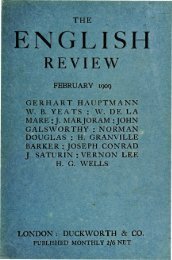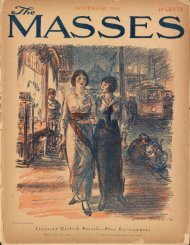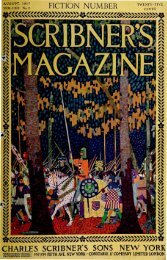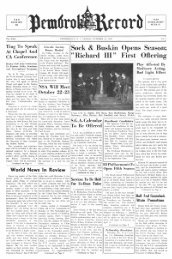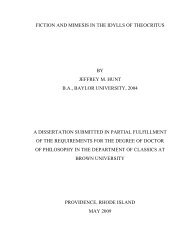View PDF - Brown Library
View PDF - Brown Library
View PDF - Brown Library
You also want an ePaper? Increase the reach of your titles
YUMPU automatically turns print PDFs into web optimized ePapers that Google loves.
Furthermore, I cannot act in this case at<br />
all because you yourselves placed it in the<br />
hands of President Taft when he was on<br />
the Isthmus a few weeks ago. He told<br />
you then that if the Supreme Court confirmed<br />
the verdict he would consent to<br />
consider the case. It is in his hands now.<br />
Leader. Must the man stay in the penitentiary<br />
till he acts ?<br />
Colonel Goethals. So far as I am concerned<br />
he must. As for your threat to<br />
leave the service, I wish to say to you and<br />
to your associates, that every man of you<br />
who is not at his post to-morrow morning<br />
will be given his transportation to the<br />
United States and there will be no string<br />
to it. He will go out on the first steamer<br />
and he will never come back.<br />
Leader. Suppose one of us should be<br />
sick?<br />
Colonel Goethals. It is an unfortunate<br />
time to be sick.<br />
Only one man failed to be at his post<br />
the next morning, and he sent a doctor's<br />
certificate saying he was too sick to be<br />
there. The mail of the chairman and<br />
chief engineer's office was stuffed with letters<br />
from signers of the resolutions asking<br />
to have their names taken off, and there<br />
was not a shadow of a strike then and<br />
there has been none since.<br />
An amusing sequel to the incident occurred<br />
on the following Sunday at a ball<br />
game at Ancon. One of the leaders of the<br />
mass meeting, who had signed the threat<br />
to leave the service and return to the<br />
United States, where, according to the<br />
resolutions, he could "enjoy the protection<br />
of the Constitution," approached<br />
the plate to bat. As he did so a clear<br />
voice from the grand stand cried: "What,<br />
you here! We thought you had gone<br />
back to the United States to enjoy the<br />
Con-sti-tu-tion !" A roar of laughter followed,<br />
and the poor fellow was not able to<br />
get within hailing distance of the ball<br />
either then or afterward, for his every reappearance<br />
was greeted with the same<br />
query, roared in joyful chorus from the<br />
entire assemblage. The colonel had got<br />
the laugh on the would-be strikers by<br />
his straightforward and indisputably just<br />
handling of the affair and nothing more<br />
disastrous than that could happen to<br />
them.<br />
Personality of Colonel Goethals 149<br />
The colonel's custom of spending a part<br />
VOL. LVII—15<br />
of each day, usually the forenoon, in visiting<br />
the work, gave him a knowledge of<br />
every part of it that often caused a rude<br />
shock to some subordinate official whose<br />
performance was not quite up to the mark.<br />
No such official could foresee when the<br />
colonel, in his personal railway motor-car,<br />
known because of its color as the "Yellow<br />
Peril," might appear on the scene; neither<br />
could he foresee what defect or shortcoming<br />
the keen eyes of the chief engineer<br />
might detect.<br />
Toward the end of the task, when completion<br />
ahead of time was assured, a tendency<br />
to relax effort became visible in<br />
several quarters, due partly to lessened<br />
tension and partly to a desire to make the<br />
job hold out as long as possible. In one<br />
such instance the colonel appeared suddenly<br />
on the spot and called the foreman<br />
in charge to account for slowness. The<br />
foreman said: "Oh, that's all right. I have<br />
one hundred days in which to complete<br />
the job." "That's not the way I work,"<br />
replied the colonel. Returning to his<br />
office he sent for the foreman's superior<br />
officer and told him the work must be<br />
pushed more rapidly. A few days later<br />
he revisited the work and saw that his<br />
order had not been obeyed. He then issued<br />
an order transferring the work from<br />
the official who had charge of it to his personal<br />
direction, and directing that the<br />
plant be removed to a different location<br />
on the Canal line and consolidated with<br />
another.<br />
The official who had been in charge of it<br />
and who was retained under the colonel's<br />
personal direction called upon him saying<br />
that unless the transfer order was either<br />
revoked or modified he should have to resign,<br />
as it overruled him, adding of the<br />
order that it could not be obeyed because<br />
it would cause friction between the two<br />
forces, and the men would refuse to be<br />
transferred. "Send the men to me," said<br />
the colonel; "I am the best handler of<br />
friction on the Isthmus." The men called<br />
on the colonel and retired from the interview<br />
content to be transferred. The official<br />
again protested that the order could<br />
not be obeyed because the tools were<br />
not at the new location. " When were you<br />
at the old place?" asked the colonel.<br />
"Yesterday morning," was the reply. "I<br />
had a special train at the old place," con-



